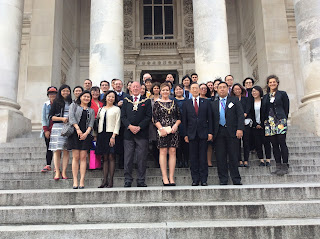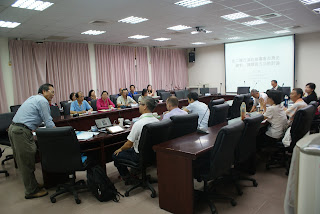Associate Professor Yoshihisa Amae presented a paper at the 59th annual conference of the American Association for Chinese Studies (AACS) at the University of South Carolina in Columbia, South Carolina on October 20-22, 2017.
The paper is entitled “When Wansei Comes ‘Home:’ Myth, Production, and the Politics of Colonial Nostalgia in Postcolonial Taiwan”,
Here the program as pdf
Graduate Institute of Taiwan Studies - Chang Jung Christian University
長榮大學台灣研究所
Wednesday, November 1, 2017
Tuesday, October 31, 2017
Sunday, October 2, 2016
International Conference on Intersectional Perspectives on Migration, Displacement and Human Rights (Joint Taiwan-Austrian Seminar MOST/FWF)
Chang Jung Christian University, Graduate Institute of Taiwan Studies and the Department of East Asian Studies - Sinology at the University of Vienna
27 to 31 October 2016
移民、遷徙與人權的多面交錯觀點
(臺灣-奧地利(MOST/FWF雙邊研討會)
長榮大學臺灣研究所與 維也納大學漢學系
時間:2016年10月 27-31日
地點:長榮大學, 第一教學大樓2樓T10201
For more information, please visit our conference site
Chang Jung Christian University, Graduate Institute of Taiwan Studies and the Department of East Asian Studies - Sinology at the University of Vienna
27 to 31 October 2016
移民、遷徙與人權的多面交錯觀點
(臺灣-奧地利(MOST/FWF雙邊研討會)
長榮大學臺灣研究所與 維也納大學漢學系
時間:2016年10月 27-31日
地點:長榮大學, 第一教學大樓2樓T10201
For more information, please visit our conference site
Friday, October 23, 2015
Saturday, October 17, 2015
Yoshi Amae, Chuang Hui-tun and Jens Damm present paper at the Jointseminar on Gender and Intersectionality in Taiwan and Austria, Department of East Asian Studies, University of Vienna 21/22 – 24 October 2015
Gender and Intersectionality in Taiwan and Austria - Joint Seminar Department of East Asian Studies, University of Vienna
21/22 – 24 October 2015, see
http://www.tsc-conference.univie.ac.at/program/
21/22 – 24 October 2015, see
http://www.tsc-conference.univie.ac.at/program/
Jens Damm presenting a paper "The Ethnic Chinese Diaspora and the Transnationalization of China Studies" at the workshop “China Studies in a Global Context”, Free University Berlin
ORGANIZERS:
PROF. DR. DR. H.C. MECHTHILD LEUTNER, FU BERLIN
PROF. DR. KATJA LEVY, FU BERLIN, UNIVERSITÄT WÜRZBURG
PROF. DR. ZHANG XUDONG / NEW YORK UNIVERSITY / PEKING-UNIVERSITÄT
Globalization has left its mark on academia – and its consequences are particularly obvious in fields that deal with the »world« across national and cultural divides like area studies do. Discourses about global affairs have become global discourses. Modern China Studies / Sinology is very much part of this dynamic. The field needs to come to terms with a multitude of new challenges: How do the increasing economic, political, cultural and social ties between China and the world alter the field? How do they impact processes of knowledge production? And how do China Studies /Sinology position themselves theoretically to adjust to a context in constant flux? Old premises have been placed under rigorous scrutiny. »Western« sinology’s historical roots in colonialism are reexamined. Is a science that was born complicit in subduing old China up to the task to help the world understand a newly returned contemporary China? How does it have to readjust – and which of its conceptualizations have stood the test of time?
See http://www.konfuziusinstitut-berlin.de/html/de/veranstaltungsprogramm/workshops/china-studies-in-a-global-context/index.html
PROF. DR. DR. H.C. MECHTHILD LEUTNER, FU BERLIN
PROF. DR. KATJA LEVY, FU BERLIN, UNIVERSITÄT WÜRZBURG
PROF. DR. ZHANG XUDONG / NEW YORK UNIVERSITY / PEKING-UNIVERSITÄT
Globalization has left its mark on academia – and its consequences are particularly obvious in fields that deal with the »world« across national and cultural divides like area studies do. Discourses about global affairs have become global discourses. Modern China Studies / Sinology is very much part of this dynamic. The field needs to come to terms with a multitude of new challenges: How do the increasing economic, political, cultural and social ties between China and the world alter the field? How do they impact processes of knowledge production? And how do China Studies /Sinology position themselves theoretically to adjust to a context in constant flux? Old premises have been placed under rigorous scrutiny. »Western« sinology’s historical roots in colonialism are reexamined. Is a science that was born complicit in subduing old China up to the task to help the world understand a newly returned contemporary China? How does it have to readjust – and which of its conceptualizations have stood the test of time?
See http://www.konfuziusinstitut-berlin.de/html/de/veranstaltungsprogramm/workshops/china-studies-in-a-global-context/index.html
Subscribe to:
Comments (Atom)



























